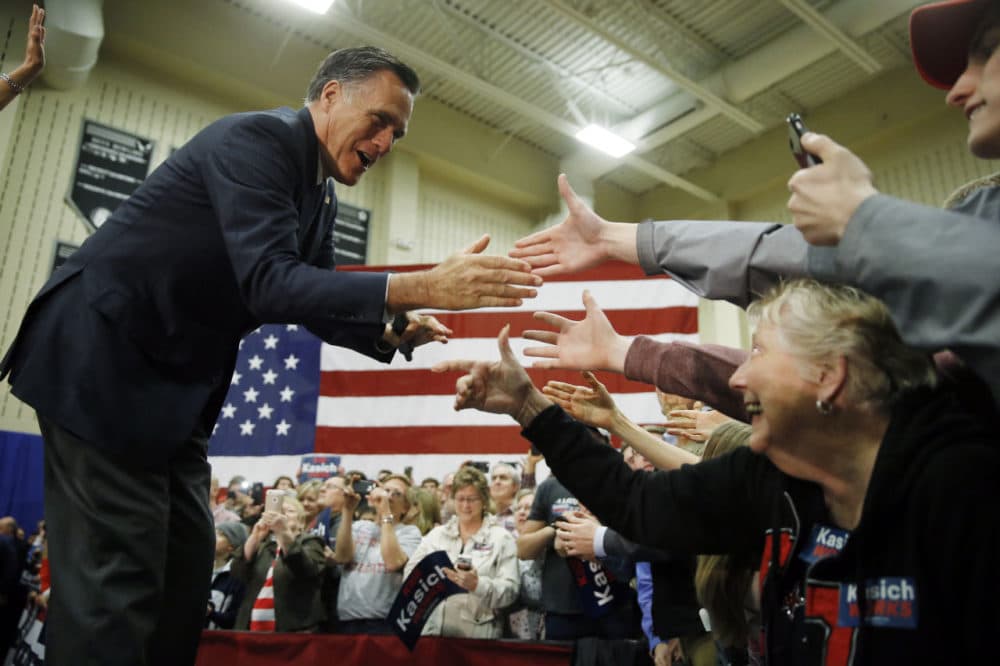Advertisement
WBUR Poll Analysis: Romney Candidacy Would Bring Risks For Both Trump And Clinton

After a deeply fractious primary, most of the GOP seems to be making their peace with Donald Trump as their nominee for president.
But for a few hardy souls dedicated to stopping Trump, the struggle continues. The Washington Post reported over the weekend that a small faction, including former Massachusetts Gov. and 2012 presidential nominee Mitt Romney, is actively exploring a third-party bid. Romney himself is being considered as a backup candidate if the group cannot convince another, like Nebraska Sen. Ben Sasse, to jump in.
If Romney (or another right-leaning third-party candidate) does end up running, our new WBUR poll (topline, crosstabs) of New Hampshire shows his impact is not a clear win for the "Never Trump" movement.
Yes, among likely New Hampshire voters Clinton comes out on top against Romney and Trump, but the overall margin moves only slightly, as both she and Trump lose supporters to Romney. Clinton draws 37 percent of the vote to Trump’s 33, while Romney attracts 21 percent of voters — a very respectable number for a candidate not even in the race.
Clinton’s 4-point margin in this scenario is wider than her scant 2-point edge when running head-to-head against her fellow New Yorker. But Romney’s presence does not help her as much as might be expected. This is because she also loses a healthy chunk of voters to Romney; 15 percent of Clinton voters would defect to Romney, compared with 22 percent of Trump’s camp.
If the intention is to act as a spoiler, the "Never Trump" crowd would prefer to see a more one-sided effect, where Romney’s presence has a more disproportionately negative impact on Trump. But would-be Romney supporters are about equal in their dislike and distrust of Clinton and Trump. As a result, adding Romney to the mix is closer to a wash than might be expected.
Clinton May Be The Best 'Never Trump' Candidate
One key reason for this is that Clinton is effectively serving as the anti-Trump candidate already, and not just for Democrats. Republicans and right-leaning independents turned off by Trump also say they would support Clinton. She pulls 18 percent of Republican women when matched up against Trump, and 11 percent of Republican men.
These numbers shrink considerably when Romney is introduced as an alternative. Looking at the demographics of who shifts from Clinton to Romney, 84 percent of Clinton’s lost voters are either registered Republicans or independents.
Yes, Trump loses more. In fact, his losses among Republican women are huge; he goes from drawing 67 percent when competing just against Clinton to just 47 percent in a three-way race. But his overall losses are not much larger than Clinton's, and the balance is close enough to leave the question open whether a third-party bid would hurt Trump or Clinton more.
The ultimate question for the "Never Trump" team is which group is bigger: Clinton’s crossover anti-Trump vote, or the bloc voting reluctantly supporting Trump now but looking for an alternative. Right now, reluctant Trump voters make up a bigger slice of the electorate than Clinton’s crossovers in New Hampshire. But this may not last, and it may not be the case elsewhere. If Clinton were a strong and popular nominee, dividing the Republican side would almost surely help her. But Clinton is relying somewhat on tentative support from Republicans opposed to Trump. If Romney enters and takes those Republican votes from her, the picture becomes a bit murkier.
Could Romney Actually Win New Hampshire?
Romney’s unexpected strength offers another intriguing wrinkle. He is within shouting distance of competing to win the state, rather than just stopping Trump. Entering as a third-party candidate would be a steep uphill climb for any number of logistical reasons. But with universal name ID and 21 percent support, he would enter the race much stronger than a simple protest candidate. His favorables are not high, but neither are Clinton or Trump’s. About a third hold a favorable view of Clinton, a third like Trump, and a third like neither of them. With such a large number of voters sour on both parties' likely nominees, the door is at least slightly open.
If he were to make a go of it, Romney’s best shot may be an appeal to moderate and right-leaning women voters. Romney does surprisingly well with Republican women, pulling 40 percent to Trump’s 47 percent. Among independent women, he out-polls Trump 26 to 22 percent. He may be the first Republican in recent history to do better among women overall than among men, owing significantly to Trump’s appeal to men and his well-documented struggle with female voters.
Here too though, the risk is keen. Since Clinton is counting on a yawning gender gap in her contest with Trump, Romney focusing on building support among women risks dividing the anti-Trump forces against themselves and inadvertently boosting Trump.
Clinton is still locked in a seemingly interminable primary with Vermont Sen. Bernie Sanders. When it wraps up, she may gain a comfortable edge as the Democratic party coalesces around her. If so, it would reduce the risk of a third party bid upsetting a race that rests on a razor's edge.
But for the moment, the anti-Trump holdouts in the Republican party have a lot to consider as they plan their next move.
Steve Koczela is president and Rich Parr is research director of the MassINC Polling Group. They are regular contributors to WBUR Politicker.